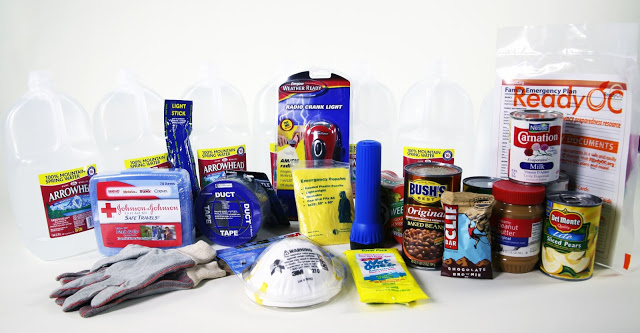Spring is not only a season of warmer weather, but also the time of year when many people catch the cleaning bug. As you compile a list of spring-cleaning tips for your readers, please consider home emergency preparedness kit refresh suggestions from ReadyOC.
 |
| Photo Credits: © ReadyOc.org |
Sad to say, I haven’t even started putting together my home emergency kit. I keep saying I will do it, I’ll clean out one of the many Rubbermaid bins in my garage and start collecting items. I know I have many of the necessities listed, they just aren’t “assembled” into one location. It’s certainly time to do it!
This public service campaign is aimed at educating and empowering the Orange County community to better prepare for any emergency. Most often, people prepare a kit and then forget about it! So the time for “spring-cleaning” is a great opportunity to check the contents again. ReadyOC offers the following simple tips for your readers to ensure they have the appropriate items and what to look for in updating them:
Medicine: Do you have enough medicine to last several days? In the case of a disaster, ReadyOC recommends that every emergency kit include not only over-the-counter medicines, but also prescription medications. Typically, over-the-counter medications last one to three years. It is also suggested that prescription eye glasses, along with feminine supplies and personal hygiene items are added to emergency supplies.
Non-Perishable and Canned Food: Is your three day supply of non-perishable and canned food several years old? ReadyOC suggests that families check that these items have not expired. Most dates can be found on the top or bottom of the package. Also, verify that each emergency kit contains a can opener for those hard to open items.
Water: When was the last time your emergency gallon of water was replaced? If it has been more than six months, ReadyOC advises that a new gallon of water, which can be used for drinking and sanitation, is replenished. Also, confirm that each member of your family has at least one gallon of water per day, to last for at least three days.
Batteries: How many batteries are included in your emergency kit? Test the batteries to verify that they can still power flashlights and radios. Batteries last, on average, for about six months. ReadyOC also suggests that citizens double check that each kit contains plenty of extra batteries.
Miscellaneous Items: Are your collections of sample-sized products, clothing, bedding and towels piling up? ReadyOC recommends to add extra sample foods, toiletries, detergents, and household items to an emergency kit. Instead of giving away old clothing, bedding and towels to Goodwill or other charities, consider setting aside several sets of each for emergencies.





